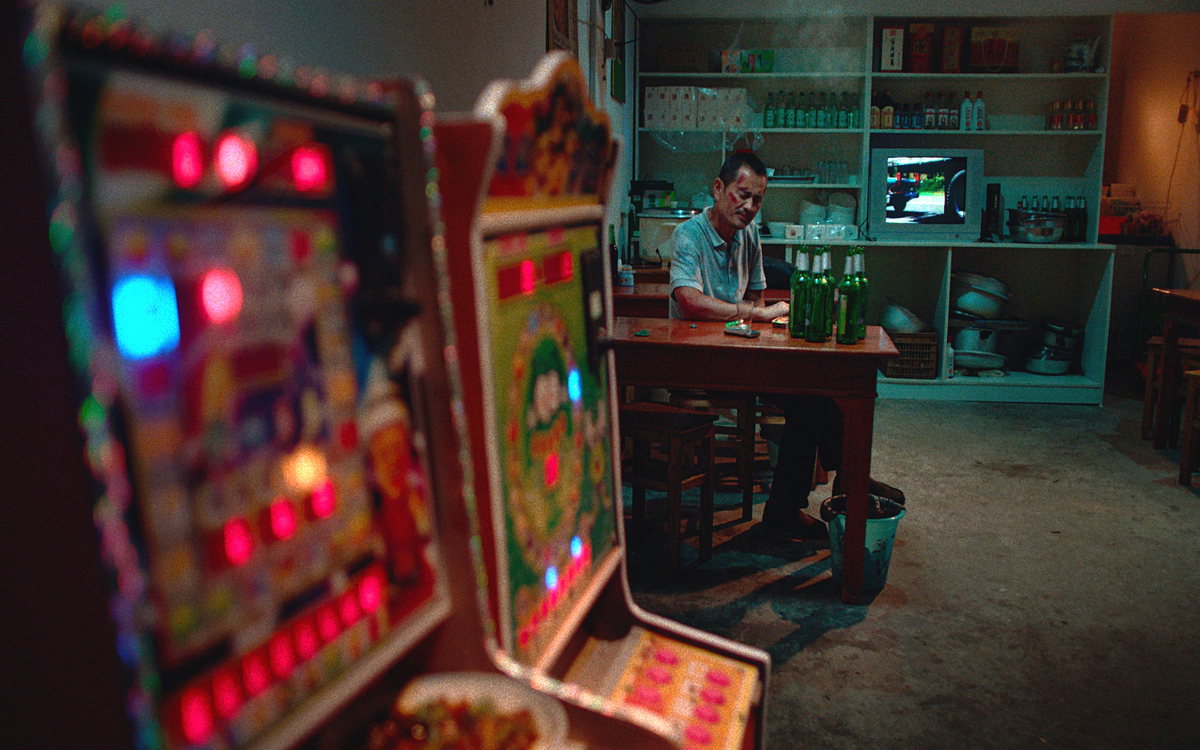Every day while CFI’s Hollywood readers take in the business of the Chinese film industry, the actual movies can sometimes seem exotic or remote. But in major US cities, mainstream Chinese films are increasingly available: thanks to Wanda’s purchase of AMC and distributors like China Lion, they get American theatrical releases practically simultaneous to their premieres at home. Though they receive virtually no publicity outside the non-Chinese community, these films are more than worth seeking out by anyone serious about engaging the Chinese industry, understanding the Chinese sensibility and familiarizing themselves with China’s talent pool. Periodically, CFI will review and point readers in the direction of noteworthy US releases of contemporary commercial and independent Chinese titles.
Neorealist Noir
Old Stone (2016), written and directed by Johnny Ma.
Distributed by Zeitgeist Films, opens in New York November 30, 2016, with subsequent expansion to Seattle, Los Angeles, Pasadena, San Francisco and other US cities (cinemas and dates here).
Grade: B+
A driver hits a pedestrian, but then instead of helping runs over them again a few more times until they are dead: this scenario has unfolded with sickening regularity in China in recent years, captured on phonecams and surveillance video, and spread across a horrified social media. The variations start to resemble the most depressing game of Clue ever: a Volkswagen Passat and a 64-year-old man in Zhejiang Province; a BMW and a three-year-old boy in Jiangsu; two trucks and a two-year-old girl in a market in Guangdong. This last case occurred in 2011 when little Wang Yue was hit not once but twice, while at least 18 people walked around her broken body until an aging garbage woman stopped to offer assistance.
Why? In China, victims who survive being hit by a car can claim lifelong compensation and medical bills from the responsible driver. But if they die, their family can only claim a smaller, single payment. (Good Samaritans who stop to help a stranger risk being held responsible for the accident itself.) Such cases have prompted debate about China’s justice and insurance systems, as well as deeper soul-searching about ethics in a rapidly changing society. Though reforms are being sought, these tragedies continue.
Old Stone (Lao Shi/老石), the debut feature by Chinese-Canadian director Johnny Ma, makes a kind of hybrid neorealist-noir from this material, something akin to the rising, ultra-unreal (chaohuan) sensibility, through the story of a hapless taxi driver, the titular Lao Shi, whose desire to act morally is at every turn thwarted by an inhuman system.
Opening shots of a forest swaying against a stormy sky set the stage for an epic parable. These will repeat throughout the film, imbuing a contemporary drama with the resonance of ancient myth, not to mention the aesthetics of Chinese shanshui painting, which emphasizes the insignificance of human life in comparison to nature. We’re introduced to Lao Shi (the grizzled Chen Gang, channeling some of Chow Yun-Fat’s grittier portrayals) sitting in a car with his omnipresent cigarette, listening to a radio report of yet another hit-to-kill case. Flash back to three months earlier, just as Lao Shi has hit a motorcycle courier (Zhang Zebin) with his taxi. A drunken passenger had grabbed his arm, causing the crash, then disappeared. A crowd clamors around him and the injured man, convulsing on the ground, as Lao Shi calls the police and the hospital. Rather than wait for their arrival, Lao Shi saves the man’s life by bringing him to the hospital himself. There the courier slips into a coma, while Lao Shi is billed for the first of many medical expenses. Expecting to be reimbursed by his insurance company, Lao Shi pays. This is his second mistake. His first was simply doing the right thing.
“To be completely honest,” says a lawyer he consults, “and this is not a nice thing to say, but if he had died at the scene, this would have been a much easier situation.” This is only after Lao Shi tries the normal channels – his boss, the insurance company, and the police, all of whom say he should have followed procedure.
Director Ma interweaves genres adeptly, beginning in a low-key, Jia Zhangke-like social realist mode and growing increasingly expressionistic as medical costs and other pressures mount on Lao Shi (when his wife discovers he’s been paying the courier’s bills, she throws him out of the house). Late one night, the taxi driver sits by the comatose courier’s hospital bed, contemplating the unthinkable. Suddenly, alarms blare and doctors rush in, as the courier’s body surges to life. “He’s waking up!” a nurse shouts, and we’ve entered true horror territory, where the creature he has saved is now the monster who will destroy him– unless Lao Shi becomes a monster himself.
Noir, however, is the film’s true lodestar, and the film partakes of noir’s fatalism alongside some of its classic scenes: the stakeout, the follow, the shakedown in a hotel lobby, the drinking in a dive bar, and finally, the drive down a country road in the dead of night. This is where the film ends, in the dark swamp of the soul, with twist that recalls O. Henry as much as muses like Kafka and Dostoevsky.
Cinematographer Leung Ming-Kai renders the third-tier city of Guangde (Anhui province) stunningly, shrouding it in blue dusk and streaks of neon. The music (by Lee Sanders) and sound design delicately shape the tension with unsettling strings and chimes. Technically, the film is a modest indie more in the vein of Blood Simple or One False Move than Chongqing Hotpot or something by Michael Mann. Made under Canada’s coproduction treaty with China, Old Stone has, despite provocative subject matter, already been approved for Chinese distribution, but it has not yet been given a release date—and though it plumbs bureaucratic indifference and corruption in ways similar to I Am Not Madame Bovary, its grim relentlessness and lack of polish and star power restrict it from the kind of Chinese commercial prospects enjoyed by Feng Xiaogang. When and if China’s recently announced arthouse film circuit is up and running, Old Stone may be the ideal kind of title for it to spotlight.
Ma’s spare script allows the cast to inhabit their characters with subtlety and realism, particularly Chen Gang, whose tired face and masterful performance captures one of the most fascinating aspects of this story, Lao Shi’s frustrating ambiguity. His actions seem to spring less from deep conviction of what’s right than from simple stubbornness or failure to think things through. Is he a “bullshit hero” like his taxicab captain (Wang Hongwei) shouts at him at one point? Or is he, in fact, the only kind of hero – an imperfect one?
WHAT DOES THE GRADE MEAN?
Here are some recent & modern-era vintage Chinese and Hong Kong films for comparison
- A+
- PLATFORM (2000, dir Jia Zhangke)
- THE WORLD (2004, dir. Jia Zhangke)
- DRUNKEN MASTER 2 (1994, dir. Lau Kar Leung & Jackie Chan)
- KUNG FU HUSTLE (2004, dir. Stephen Chow)
- A
- LET THE BULLETS FLY (2010, dir Jiang Wen)
- THE MERMAID (2016, dir. Stephen Chow)
- A TOUCH OF SIN (2013, dir. Jia Zhangke)
- STILL LIFE (2006, dir. Jia Zhangke)
- MOUNTAINS MAY DEPART (2015, dir. Jia Zhangke)
- LITTLE BIG SOLDIER (2010, dir. Ding Sheng)
- EXTRAORDINARY MISSION (2017, dir. Alan Mak & Anthony Pun)
- MR SIX (2015, dir. Guan Hu)
- A WORLD WITHOUT THIEVES (2004, dir. Feng Xiaogang)
- SUZHOU RIVER (1999, dir. Lou Ye)
- HOUSE OF FLYING DAGGERS (2004, dir Zhang Yimou)
- RAISE THE RED LANTERN (1991, dir. Zhang Yimou)
- A-
- DUCKWEED (2017, dir. Han Han)
- I BELONGED TO YOU (2016, dir. Zhang Yibai)
- B+
- THE GREAT WALL (2016, dir. Zhang Yimou)
- OLD STONE (2016, dir. Johnny Ma)
- CRAZY STONE (2006, dir. Ning Hao)
- GO, LALA GO (2010, dir. Xu Jinglei)
- B
- KUNG FU YOGA (2017, dir. Stanley Tong)
- RAILROAD TIGERS (2016, dir. Ding Sheng)
- THE WASTED TIMES (2016, dir. Cheng Er)
- CHONGQING HOT POT (2016, dir. Yang Qing)
- MONSTER HUNT (2015, dir. Raman Hui)
- B-
- JOURNEY TO THE WEST: THE DEMONS STRIKE BACK (2017, dir. Tsui Hark)
- SOME LIKE IT HOT (2017, dir. Song Xiaofei & Dong Xu)
- BORN IN CHINA (2016, dir. Lu Chuan)
- D-
- TINY TIMES (2013, dir. Guo Jingming)






